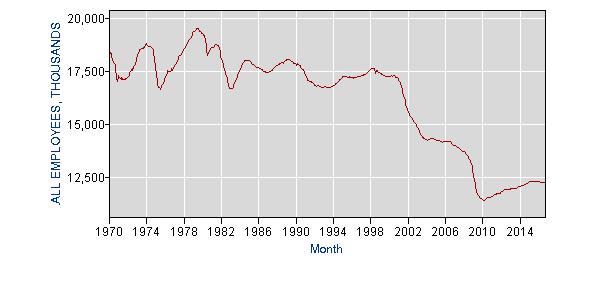August 27, 2017
Someone who had no knowledge of trade deals like NAFTA and the TPP would be justified in thinking they must be really bad news since their supporters have to make up obviously absurd claims to push their position. George Will is on the job this morning in his Washington Post column.
“Mark Perry of the American Enterprise Institute says that in the past 20 years the inflation-adjusted value of U.S. manufacturing output has increased 40 percent even though — actually, partly because — U.S. factory employment decreased 5.1 million jobs (29 percent). Manufacturing’s share of gross domestic product is almost unchanged since 1960. ‘US manufacturing output was near a record high last year at $1.91 trillion, just slightly below the 2007 level of $1.92 trillion, and will likely reach a new record high later this year,’ Perry writes. That record will be reached with about the same level of factory workers (fewer than 12.5 million) as in the early 1940s, when the U.S. population was about 135 million. Increased productivity is the reason there can be quadrupled output from the same number of workers. According to one study, 88 percent of manufacturing job losses are the result of improved productivity, not ‘rapacious’ Chinese.”
Okay, this one is in “how stupid do you think we are?” department. Guess what, the tree in my backyard is taller than ever before. Imagine that?
Yes, economies grow through time and so does productivity. That means that, in general, we expect output in most areas, like cell phones, haircuts, and manufactured goods to increase through time. So telling us we are near record levels of manufacturing output is basically telling us absolutely nothing. It is the sort of thing that only a cheap demagogue or someone totally ignorant of economics would do.
The basic story is that we have seen productivity growth in manufacturing as in all areas. Since growth has been somewhat faster in manufacturing, it has meant that manufacturing jobs have declined as a share of total employment, but generally, the increase in demand has been enough to keep employment in the sector roughly constant. The big exception was the period when our trade deficit exploded at the start of the last decade, eventually reaching almost 6.0 percent of GDP.
Here’s the picture.
Manufacturing Jobs

Source: Bureau of Labor Statistics.
As can be seen, there is relatively little change, apart from cyclical ups or downs, in manufacturing jobs from 1970 until the late 1990s. Employment then plunges in the first half of the 2000s (before the Great Recession) due to the explosion of the trade deficit. This job loss was due to trade, but George Will and other supporters of U.S. trade policy think they have to lie to people and deny this fact.
While the trade deficit has declined somewhat in more recent years due to the drop in the value of the dollar, it is still near 3 percent of GDP (around $540 billion a year). The idea that it would not create more manufacturing jobs if we had more nearly balanced trade is absurd on its face (i.e. we could produce another $500 billion in manufactured goods every year without employing more workers), but apparently folks like George Will and the Washington Post editors want us to believe it.
Since we’re on the topic of lying to promote trade deals designed to redistribute upward let’s again note the famous 2007 Washington Post editorial touting NAFTA that told readers:
“Mexico’s gross domestic product, now more than $875 billion, has more than quadrupled since 1987.”
According to the IMF, Mexico’s GDP grew by 83 percent over this period, which is pretty far from quadrupling. Honest newspapers correct their mistakes, but as the slogan at the Washington Post says, “lies in the service of giving more money to rich people are no vice.”







Comments